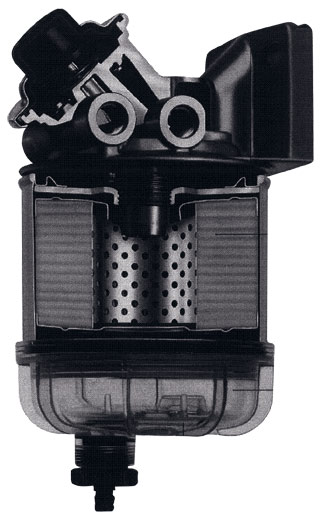Filter
Long life for your motor
The filter/separators that we suggest, separate the solid particles contained in the fuel by a centrifugal action, these particles fall to the bottom and the cartridge then filters out the last remaining drops of water and extremely fine matter. The advantages of such a filter are that it permits no particles of water or solids to pass through. It is mounted between the tank and the motor, which allows it to be changed without having to readjust the engine and finally, if it is saturated, it will not permit the passage of water. In this situation, the system is drained and the engine stopped without any damage. The smallest model is designed for a maximum flow of 57 l / h. This may seem excessive on a sail boat, but rest assured what can do more can cope with less.


Tips
When wintering, it is important to avoid condensation forming in the tank. For this, it is imperative to fill the tank with fuel. If air is left in the tank it creates condensation, this leads to drops of water. Water in diesel contributes to the formation of bacteria (which draw oxygen to breathe.) These bacteria cause the formation of sludge in the bottom of the tank that could clog the fuel system of the engine. It is advisable to put an anti-bacterial product in the fuel to prevent their development. We also advise static cleaner filters, these stabilise the fuel and eliminate deposits from the tank.
When wintering, it is important to avoid condensation forming in the tank. For this, it is imperative to fill the tank with fuel. If air is left in the tank it creates condensation, this leads to drops of water. Water in diesel contributes to the formation of bacteria (which draw oxygen to breathe.) These bacteria cause the formation of sludge in the bottom of the tank that could clog the fuel system of the engine. It is advisable to put an anti-bacterial product in the fuel to prevent their development. We also advise static cleaner filters, these stabilise the fuel and eliminate deposits from the tank.
